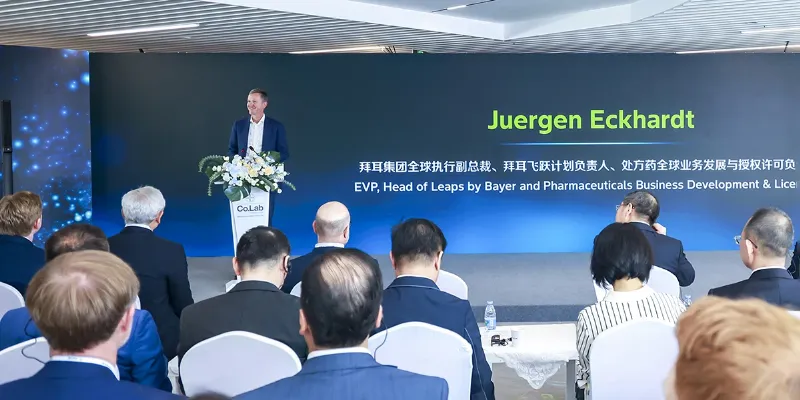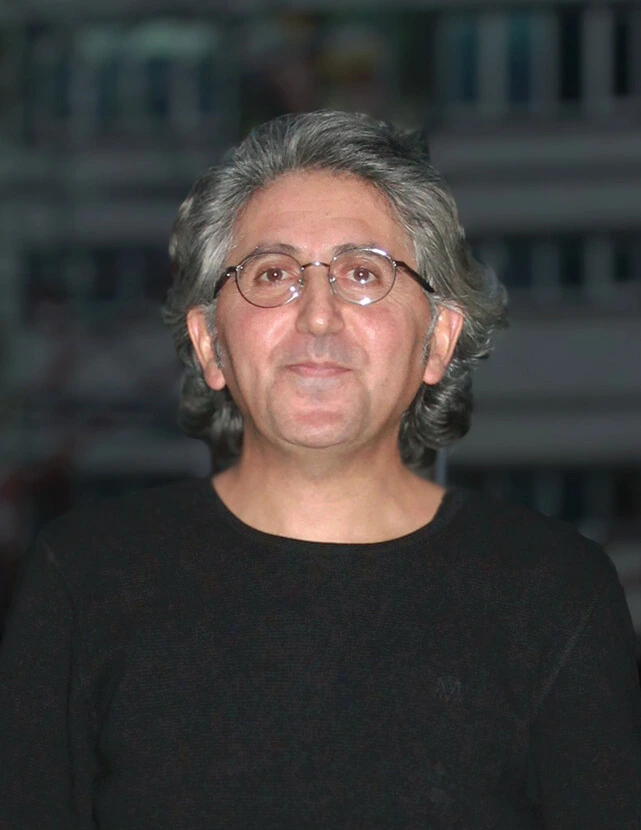How Bayer Shapes Strategic Partnerships for the Next Generation of Cancer Therapies


ONCOLife |
20 February 2025
Bayer continues to form new partnerships to expand its targets for cancer treatment, recently collaborating with MOMA Therapeutics and NextRNA, two pioneers in oncology innovation. In this exclusive interview, Dr. Juergen Eckhardt, Head of Business Development and Licensing at Bayer Pharmaceuticals, unveils the company’s oncology strategy, emphasizing its commitment to addressing unmet medical needs and delivering transformative therapies to patients.
Exclusive interview with Dr. Juergen Eckhardt
With nearly one-third of Bayer’s pipeline dedicated to oncology, Dr. Eckhardt shares insights into advancing treatments for prostate cancer, rare genetic mutations, and other challenging indications through strategic partnerships and cutting-edge research.
Click the picture to view the PDF version: Pg 36-39.
How does Bayer’s strategic approach to new partnerships align with its current market position in oncology, and how do you see the company navigating the evolving landscape of cancer treatment in the coming years?
Dr. Eckhardt: Bayer’s ambition is to develop innovative medicines to improve and extend the lives of cancer patients, focusing on areas of high unmet need. We prioritize compounds that target genital urinary cancers, gastrointestinal cancers, solid tumors, and non-small cell lung cancers, with prostate cancer as our core focus.
Our oncology portfolio includes five approved drugs, with Nubeqa, developed with Orion Corporation, as our key growth driver in prostate cancer. Another major product in this area, Xofigo, is the first targeted radiopharmaceutical therapy for prostate cancer, stemming from a 2014 acquisition of Algeta ASA, a Norwegian company.
Bayer is leading the way in precision oncology treatments with Vitrakvi, a first-in-class TRK inhibitor targeting tumors with TRK fusion, regardless of location. This drug, developed in partnership with Loxo Oncology, was FDA-approved based on a genetic alteration rather than cancer location, a landmark achievement in the EU and the only TRK inhibitor specifically designed for this purpose.
Bayer is also investing in targeted radionuclide therapies (TRT) and next-generation immuno-oncology (IO) therapiesas well as tumor intrinsic pathways. Our ongoing pipeline development in these areas strengthens and diversifies our oncology portfolio, always driven by patient needs…
As demonstrated, partnerships are integral to our strategy. They enhance our disease understanding, help us identify novel therapeutic targets, and accelerate the growth and development of these compounds. Bayer’s oncology vision is to lead with cutting-edge therapies, collaboratively harnessing scientific advances to deliver groundbreaking treatments to patients with the highest medical need.
Bayer has recently entered into significant partnerships with MOMA Therapeutics and NextRNA. Could you elaborate on how these collaborations fit into Bayer’s overall oncology strategy and its long-term vision for advancing precision medicine?
Dr. Eckhardt: We’re very proud of these partnerships, as they exemplify our approach to sourcing innovative compounds that address the highest medical needs and offer meaningful differentiation. With over 100 types of cancer, each with unique biology affecting therapy response, Bayer’s oncology R&D strategy is disease-centric and precision-focused.
We’re making significant research investments with the potential to transform cancer care. Our vision emphasizes the pivotal role of partnerships in enhancing our disease understanding and in developing disruptive treatments that challenge the status quo
The partnership with MOMA Therapeutics centers on their KNOMATIC™ platform for targeting dynamic proteins. How does this platform differ from other approaches in precision oncology, and what potential do you see in targeting dynamic proteins for future cancer treatments?
Dr. Eckhardt: MOMA is uniting groundbreaking advances across biochemistry, biophysics, structural biology, chemistry, and functional genomics. Their proprietary KINOMATIC drug discovery platform targets difficult-to-drug, highly dynamic proteins that play critical roles in diseases, including cancer. These dynamic proteins require precise, stepwise changes in protein conformation, which MoMA’s platform exploits with targeted and precise methods.

The KINOMATIC platform integrates deep structural insights with advanced hit-finding technologies and computation-enabled lead optimization, accelerating the discovery of therapies that effectively address these complex proteins. We believe that targeting dynamic proteins with a small molecule approach opens a largely untapped path for developing innovative cancer therapies.
NextRNA’s focus on long non-coding RNAs (lncRNAs) offers a novel approach to cancer therapy. Could you discuss the significance of lncRNAs in oncology and how Bayer plans to leverage this technology to develop first-in-class treatments?
Dr. Eckhardt: We’re excited to partner with NextRNA in this field. Long non-coding RNAs represent a new target class in oncology and beyond. Despite progress against some cancers, significant unmet needs remain across various cancer types and patient populations.
We see a tremendous opportunity in exploring non-coding regions of the genome, such as long non-coding RNAs, to expand beyond protein-targeted therapies. This preclinical collaboration between Bayer and NextRNA focuses on developing small molecules that specifically address these unique RNA targets.
What role does Bayer’s external innovation strategy play in filling gaps in your internal R&D capabilities, particularly in the rapidly evolving field of oncology?
Dr. Eckhardt: To grow our pipeline value, driving innovation is essential, and strategic partnerships are at the heart of this effort. Bayer is deeply committed to co-creating innovative solutions with leading scientists.
Our oncology-focused collaborations highlight this approach. For example, Bayer partnered with Recursion last year to advance oncology R&D. In March, we entered a multiyear collaboration with Aignostics, a spin-off from Berlin’s Charité University Clinic, to identify novel oncology targets with strong disease links.
Another key partnership is with the Broad Institute of MIT and Harvard, which led to the development of a HER2-mutant EGFR inhibitor, the first reversible small molecule targeting HER2 activating mutations and EGFR exon 20 insertions, now in clinical testing.
Additionally, Bayer acquired Vividion in 2021, enhancing our precision drug discovery capabilities through their cutting-edge chemoproteomics platform. This acquisition led to the initiation of a Phase 1 clinical trial for an oral STAT3 inhibitor in advanced solid and hematological tumors earlier this year. Last year, Vividion began Phase 1 trials for a KEAP1 activator in advanced solid tumors. Together, these efforts exemplify Bayer’s robust pipeline and commitment to transformative cancer therapies.
Looking to the future, what additional areas within oncology are you exploring for potential collaboration or acquisition, and what emerging scientific fields are of most interest to Bayer’s external innovation team?
Dr. Eckhardt: We are actively strengthening and diversifying our oncology portfolio, focusing on areas of highest medical need and innovative approaches with meaningful differentiation. Nearly one-third of our pipeline is dedicated to oncology, with prostate cancer research remaining a primary focus.
By aligning external opportunities with internal strengths, we aim to accelerate innovation and deliver kinder, better-tolerated, and more effective treatments. Our portfolio spans precision molecular oncology, immuno-oncology, and targeted alpha therapies. Beyond prostate cancer, we target liver, renal, thyroid, colorectal, and gastrointestinal tumors, follicular lymphoma, NTRK gene fusion, and more.












Comments
No Comments Yet!